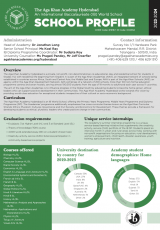Personal Project Spotlight - Nasreen Azimi
Sufism a journey into Love Maze
What aspects of your personal or cultural life motivated you to choose this particular topic?
Being someone who is interested in exploring new things, especially from my own culture, I have been reading Rumi’s poems and have seen a few whirl dances on TV but I never knew what Sufism was. I was also inspired by a book entitled “Quotes of Jalaluddin Rumi” which I choose for one of my English activities. At that time, I thought of doing my project about Sufism as it has been a big part of Afghanistan’s culture, evident in calligraphy, paintings and literature.
How did you begin the research process?
I started my research from very basic things such as “Definition of Sufism” and continued to read about its history, values, significant people and many more things, in order to understand everything clearly. However, I did not have a primary source. After a lot of thinking, I interviewed Dr. Jonathan Long, our Head of Academy. As we all are aware, he is a philosopher and his interview helped me a lot. Later on, through social media, I found an Afghan Sufi named Fahima Mirzaye and conducted an interview online. Through her answers, I learned a lot about my own culture and country, including how Sufism is being practiced there and how valuable it is.
Is the Personal Project mainly about process or product?
In my opinion it’s about both as Nick Saban states “a good process produces good results”. The process of the Personal Project is full of learning, challenge and fun. The final product is the fruit of our efforts which gives us a sense of satisfaction. Process is more about one’s own learning and product showcases our efforts and knowledge to others.
What have been the high and low points of the research and writing processes?
The high point of the research was the way in which it enhanced my communication and social skills through interviews. I connected with total strangers and leaned so much from them. However, there were low points too. For example, finding authentic information and people to interview was not easy at all. The other difficulty had to do with the writing process in two languages - English and Dari for my interview with a Sufi from Afghanistan. But as a result, I learned to explore my own language and culture.
Do you think people around you would be interested in your product?
One of the reasons I think people would be interested is that it’s about a really fascinating subject! I found people interested in Sufism and wanting to know more about Sufism. People don’t seem very interested in spirituality, religion and cultural subjects these days. However, during covid-19, people are starting to pay attention to their mental health. My topic’s focus is on how Sufism can help our mental well-being. That’s why I want my target audience to read the book!
How far has the research process and the final product impacted you personally?
When I started, I did not know much about Sufism, but in the research process I learned about it from a scientific, religious and philosophical perspective. Additionally, while gathering information I communicated with many people around me and this enabled me to gather authentic information.
What conclusions have you drawn?
After a lot of reflection on the topic, I came to the conclusion that our mindset and perspective towards any topic can affect our quality of life. For example, if we see Sufism just as a religious practice, we miss out on its scientific aspects and how it can improve our mental well-being. Also, culture is a big part of our identity and no matter in which corner of the world we live, we always tend to go back to our roots and culture. Sufism has always been valued in my culture. Due to this, I got inspired to explore this topic and I ended up learning more about my own identity and culture as well as having a chance to showcase it to others.





